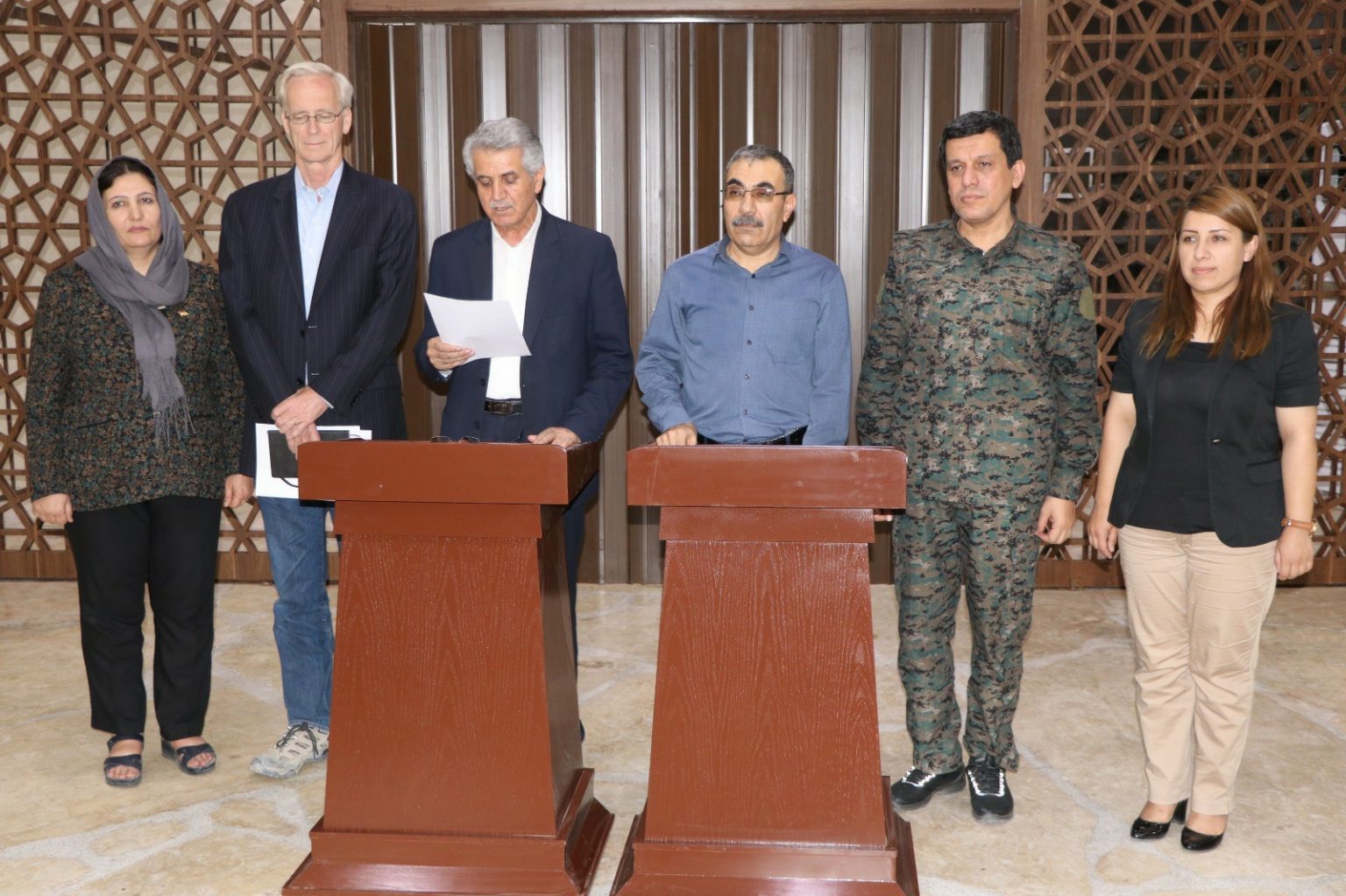QAMISHLI, Syria (North Press)- Some Kurdish politicians believe that the second stage of the intra-Kurdish talks, since the announcement of the initial agreement between the Kurdish National Council (ENKS) and the Kurdish National Unity Parties (PYNK) in June, is moving very slowly due to the procrastination of some parties and the disagreement over quotas in the political authority, while others believe that the dialogues are taking place according to the agreed mechanisms.
Ali Shamdin, a member of Kurdish Democratic Progressive Party in Syria (PDPKS), said, “There is no justification at all for all this delay in ending this dialogue, which began nearly half a year ago, as long as the two Kurdish sides adopted the Dohuk agreement as a basis for ongoing unity talks that will cover governance, administrative cooperation, and protection.”
The talks are based on the framework laid out by the two parties in the 2014 Duhok Agreement, which was signed in the Kurdistan Region of Iraq to establish a new administration in Syria’s predominantly Kurdish north; the agreement was never implemented due to disputes between the two signatories.
Deliberate procrastination
Shamdin described the delay as intended procrastination and a waste of time, referring the question to the two parties to answer the reason for this delay.
He said that his party was and still is in support of the intra-Kurdish talks, but pointed out that his party “was excluded from the dialogues on the pretext of deep differences between the two negotiating parties.”
Shamdin accused the two parties of disputes over potential new participants to the talks, something he says his party does not accept.
Who is behind this delay?
Shamdin added that he believes the two parties are clearly inclined towards stalling, despite unsuccessful pressure by the US to overcome the obstacles that prevent the desired agreement.
However, he insisted that his party has friendly relations with the two negotiated parties, and that PDKPS is still a believer in the necessity of Kurdish unity and the formation of a comprehensive and inclusive authority.
Agreed upon mechanism
Faisal Yusuf, general coordinator of the Kurdish Reform Movement and a member of the Kurdish National Council delegation, said that “the dialogues are taking place according to the mechanisms agreed upon from the very beginning, until a common political vision is reached.”
“We are discussing the agreement, as the Dohuk agreement is only a pace for the dialogue, and it begins with building a Kurdish authority,” Youssef added.
In his statement to North Press, he continued, “We seek consensus with foundations that rectify the causes of the failure of previous agreements and meet the aspirations of the Kurdish masses.”
Youssef pointed out that the negotiations are encouraging, as they have not encountered obstacles that prevent them from moving towards their goals of forming a unified Kurdish position and a real and equal partnership in the administration, in addition to finding appropriate mechanisms so that the duty of protection and defense is not limited to one party.
Youssef stressed that the ongoing dialogue is very sensitive, and that it is very important to hold out on statements to the public until results are achieved.
Other Kurdish parties
Abdul Samad Khalaf Bero, secretary of the Free Kurdish Union Party, said that the Syrian Democratic Forces (SDF) Commander Mazloum Abdi’s initiative to unify Kurdish politics came as a result of the continuing conflict in Syria and the recent Turkish invasion of the Sere Kaniye (Ras al-Ain) and Gire Spi (Tel Abyad), along with threats made by both Turkey and the Syrian government towards the areas east of the Euphrates, in addition to the dispersion and division of the Kurdish movement.
Bero said that after the two parties reached an initial political agreement, the negotiations began to delay and falter.
He added that the ratios distributing quotas in the political authority has become a point of contention because ENKS rejects any third party.
Bero pointed out that there are joint efforts by officials from SDF and American diplomats to find a way to include other parties to the future authority so that it could be comprehensive.
Obsession to detail
Bero believes that one of the most important reasons for the delay is an obsession over details, such as the details of the authority’s formation, its name, its tasks, its powers, the number of its members and the percentage of women’s representation in it.
The committees’ positions on educational curricula, recruitment, financial and economic issues, members from outside Syria, as well as the Social Contract that functions as the region’s constitution, were also allegedly among the reasons that led to this delay and the lack of an announcement of a final agreement.
Caution and lack of confidence
He added that caution and lack of confidence have dominated the dialogue as a result of the long disagreements, and the divergent agendas between the two parties were among the important reasons that led to the delay of the dialogue and the formation of the authority.
Bero told North Press that they will seek the success of the intra-Kurdish talks “no matter what the cost,” as it “serves our just cause.” He added that they are aware of the obstacles that the initiative faces, and that they hope for its success because of America’s seriousness in accelerating the realization of the initiative.
The reconciliation efforts, launched at the behest of Mazloum Abdi last year, aim to unite the leading Democratic Union Party (PYD) and the Kurdish National Council (ENKS), which is a member of the Turkish-backed Syrian opposition’s Syrian National Coalition.

